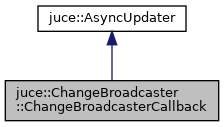◆ ChangeBroadcasterCallback()
| juce::ChangeBroadcaster::ChangeBroadcasterCallback::ChangeBroadcasterCallback |
( |
| ) |
|
◆ ~ChangeBroadcasterCallback()
| juce::ChangeBroadcaster::ChangeBroadcasterCallback::~ChangeBroadcasterCallback |
( |
| ) |
|
|
inlineoverride |
◆ cancelPendingUpdate()
| void juce::AsyncUpdater::cancelPendingUpdate |
( |
| ) |
|
|
noexceptinherited |
This will stop any pending updates from happening.
If called after triggerAsyncUpdate() and before the handleAsyncUpdate() callback happens, this will cancel the handleAsyncUpdate() callback.
Note that this method simply cancels the next callback - if a callback is already in progress on a different thread, this won't block until the callback finishes, so there's no guarantee that the callback isn't still running when the method returns.
◆ handleAsyncUpdate()
| void juce::ChangeBroadcaster::ChangeBroadcasterCallback::handleAsyncUpdate |
( |
| ) |
|
|
overridevirtual |
Called back to do whatever your class needs to do.
This method is called by the message thread at the next convenient time after the triggerAsyncUpdate() method has been called.
Implements juce::AsyncUpdater.
◆ handleUpdateNowIfNeeded()
| void juce::AsyncUpdater::handleUpdateNowIfNeeded |
( |
| ) |
|
|
inherited |
If an update has been triggered and is pending, this will invoke it synchronously.
Use this as a kind of "flush" operation - if an update is pending, the handleAsyncUpdate() method will be called immediately; if no update is pending, then nothing will be done.
Because this may invoke the callback, this method must only be called on the main event thread.
◆ isUpdatePending()
| bool juce::AsyncUpdater::isUpdatePending |
( |
| ) |
const |
|
noexceptinherited |
Returns true if there's an update callback in the pipeline.
◆ triggerAsyncUpdate()
| void juce::AsyncUpdater::triggerAsyncUpdate |
( |
| ) |
|
|
inherited |
Causes the callback to be triggered at a later time.
This method returns immediately, after which a callback to the handleAsyncUpdate() method will be made by the message thread as soon as possible.
If an update callback is already pending but hasn't happened yet, calling this method will have no effect.
It's thread-safe to call this method from any thread, BUT beware of calling it from a real-time (e.g. audio) thread, because it involves posting a message to the system queue, which means it may block (and in general will do on most OSes).
◆ activeMessage
◆ owner
The documentation for this class was generated from the following file:

